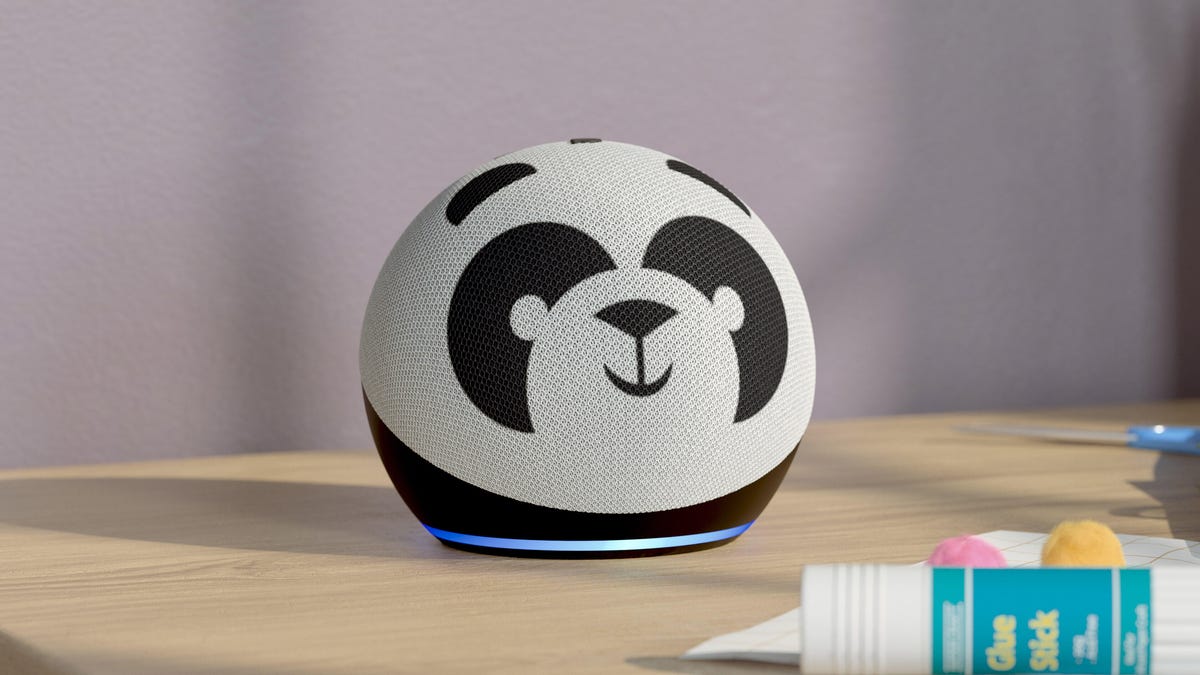 Why You Can Trust CNET
Why You Can Trust CNET Amazon's kid-savvy Alexa a welcome new option for Echo speakers
Commentary: It won't be perfect but it's progress, since we've already let Amazon Echo and other smart speakers into our homes.

Echo Dot Kids Edition panda version.
Amazon is adapting its Alexa technology so that Echo smart speakers will switch to kid-friendly mode when they detect children are speaking to them.`
Given how far these digital devices reach into our lives, that's welcome news.
Echo devices reach deeply into our existence. We use them to get answers to questions, control lights and play music. Our kids see us using them, and kids mimic their parents. So in coming months, Amazon will give parents the option of setting up voice profiles for their children in order to produce kid-friendly responses, the giant retailer said at its device product launch event Thursday.
Once voice profiles are set up, the Alexa device will return kid-friendly answers, games, music, Audible books and premium skills, for example. The feature dovetails with the new $60 Echo Dot Kids Edition, a smart speaker with panda or tiger color-scheme options, but it'll work with other Alexa devices, too.
It's a significant step forward for parents, like myself, who want their children to benefit from new technology but are worried by its many problems. Building a system to handle kids differently is important for safety, privacy and mental health.
There's no doubt about it: New technology offers children a lot. Connected devices let them tap into educational resources, satisfy their curiosity and stay in contact with friends and family. That last ability is particularly welcome while COVID-19 keeps them at home.
What we don't want is technology that exposes kids to the vast range of inappropriate content that fills parts of the web. We also don't want them hooked on services, like video games or social media sites, that can damage their self-esteem or are otherwise psychologically unhealthy.
It isn't clear yet how well Amazon's technology will work or how comprehensive it'll be. But there are good signs that Amazon is paying attention to real needs.
Take technology it demonstrated called Reading Sidekick, which listens to children read books out loud. The AI-powered assistant will offer support and even a little help if a child struggles.
See also
The Reading Sidekick could be handy for parents dealing with home schooling during extraordinary circumstances, like a coronavirus pandemic. I can't imagine it'll be as good as a real parent, teacher or other helpful human. But for plenty of families and schools, the alternative is no help at all.
The Reading Sidekick "is a feature I wanted ... so badly 4yrs ago when [my] kid was struggling with reading. Best way to help a child improve reading is to read out loud, but most kids hate doing it alone, hence why they suggest to read to pets," tech analyst Carolina Milanesi tweeted. "Sadly, pets don't give feedback."
I foresee plenty of problems. Kids often figure out how to bypass parental controls. Building a "kid mode" is hard when "kid" can range from preschooler to middle schooler. And the more customized the service is, the more worrisome the privacy implications. That's especially true with a company like Amazon that has an enormous incentive to plumb our profiles to figure out what we want to buy online. And Amazon already has privacy-related blemishes about storing Alexa's voice recordings and turning Ring security cameras into neighborhood surveillance systems.
And let's not forget that Amazon's primary interest here is keeping your family lodged in its technology realm and paying for services like Prime, Amazon Music Unlimited and Audible. Today's kids are tomorrow's subscribers.
But let's be realistic. Millions of us have already let these devices into our homes. It's better to try to wrestle with the problems than pretend they don't exist. Teaching Alexa to work smarter with kids is a start.

